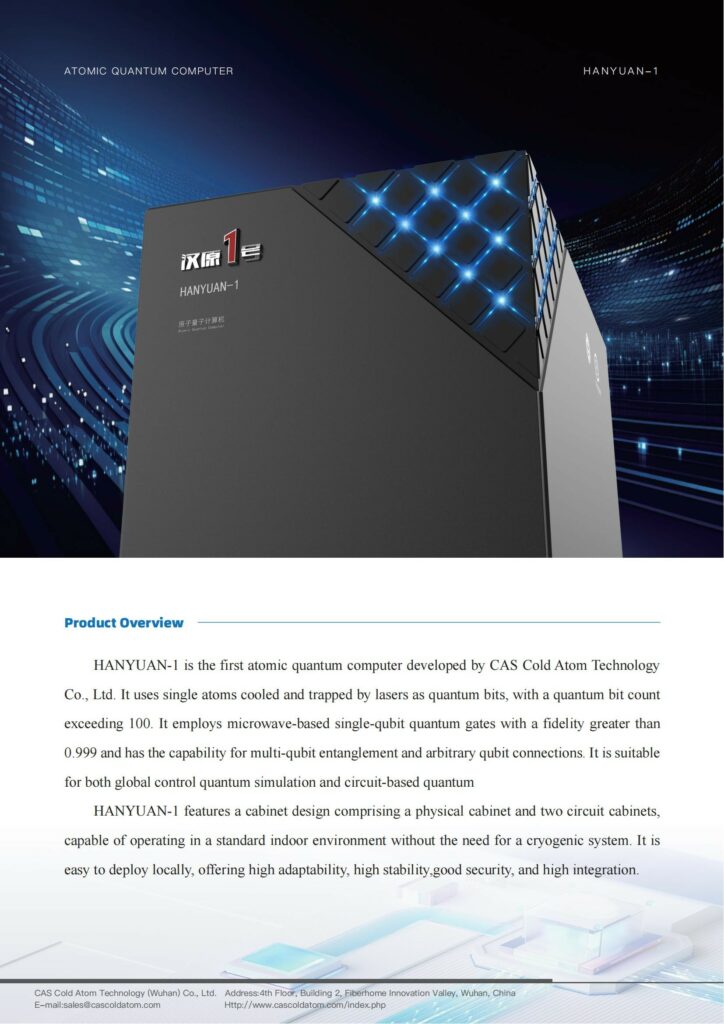
China’s first atomic quantum computer has reached a major commercial milestone, recording its first sales to domestic and international customers, according to state media. The Hubei Daily, a state-run newspaper in China’s Hubei province, reported that the first commercial Hanyuan-1 unit It was delivered to a subsidiary of telecommunications provider China Mobile, with an order also placed by Pakistan. Sales were valued at over 40 million yuan (about 5 million euros).
The report states that Hanyuan-1 is one of the few machines in the emerging field of atomic quantum computing to have achieved mass production and shipped worldwide. The development of the machine, which can be used to perform complex calculations such as financial modeling and logistics optimization , was led by the Academy of Science and Technology Innovation of Precision Measurement of the Chinese Academy of Sciences, headquartered in the Wuhan city center.
Using the principles of quantum mechanics, quantum computers can perform calculations and solve complex problems much faster than classical computers. This is achieved by using qubits, which can be both 0 and 1 simultaneously thanks to a property called superposition. However, researchers still struggle to eliminate errors in devices that handle millions of qubits.

With this challenge still unsolved, developers have taken a practical approach, initially focusing on industrial applications involving only a few dozen or a few hundred qubits. These machines are called intermediate-scale quantum computers (NISQ). Hanyuan-1 is one such machine. According to reports, the atomic quantum computer has 100 qubits and achieves “world-class performance standards.”
Unlike other quantum computers that use ions, photons, or “artificial atoms,” Hanyuan-1 uses neutrally charged atoms as qubits and manipulates them with lasers to perform calculations. Hanyuan-1 was unveiled in June, marking the culmination of nearly 20 years of research and engineering efforts that have led not only to the independence of its core components but also to several scientific breakthroughs.
Since 2018, the United States has restricted China’s access to certain quantum computing components, such as lasers, spurring China’s progress in this field . The report states that the Wuhan team overcame several challenges to develop a laser that meets high-precision requirements . As a result, the laser is significantly cheaper and uses only one-tenth the power of foreign lasers.
“This achievement breaks China’s dependence on Western supply chains and establishes an independent lead in atomic quantum computing hardware,” the report reads. Compared to traditional superconducting quantum computers, the atomic computer consumes significantly less energy, is much easier to maintain, and is ” exponentially ” cheaper to install.
This is because the system does not require cryogenic cooling . The entire system can be integrated into three standard racks and operates in a standard laboratory environment . The report states that the team is preparing to build China’s first atomic quantum computing center capable of supporting highly complex computing requirements, such as financial risk analysis for thousands of corporate users.
The paper quoted an anonymous project manager as saying, “Competition in the field currently focuses on system practicality and engineering capabilities rather than the number of qubits .” The project manager stated, “We will continue to improve the overall performance of atomic quantum computers, focusing on advanced applications such as drug discovery and materials design.”
He added: “Our goal is to provide scalable atomic computing services by 2027. The commercialization of Hanyuan-1 demonstrates China’s rapid progress in quantum computing. Despite US restrictions on technology exports, China has achieved a breakthrough through its own technological development.
In particular, the fact that it does not require cryogenic cooling and is low-cost makes it advantageous for commercial use. Superconducting quantum computers require extremely low temperatures, close to absolute zero, resulting in significant operating costs . One quantum computing expert stated, “Atomic quantum computers operate at room temperature and are easy to maintain, making them extremely practical. However, challenges remain in increasing the number of qubits and reducing error rates.”
Experts believe China has adopted a strategy focused on the practicality of quantum computing. Rather than competing on the number of qubits, it is focusing on developing systems with practical applications. The industry predicts that quantum computing will revolutionize several fields, including finance, drug development, logistics optimization, and cryptography. However, commercialization is expected to take some time.
As technology competition between the United States and China intensifies, quantum computing is becoming another competitive area, following artificial intelligence and semiconductors. China’s commercialization of Hanyuan-1 indicates that it is beginning to achieve tangible results in this competition.
Follow us on Google News to receive daily updates on cybersecurity. Contact us if you would like to report news, insights or content for publication.
